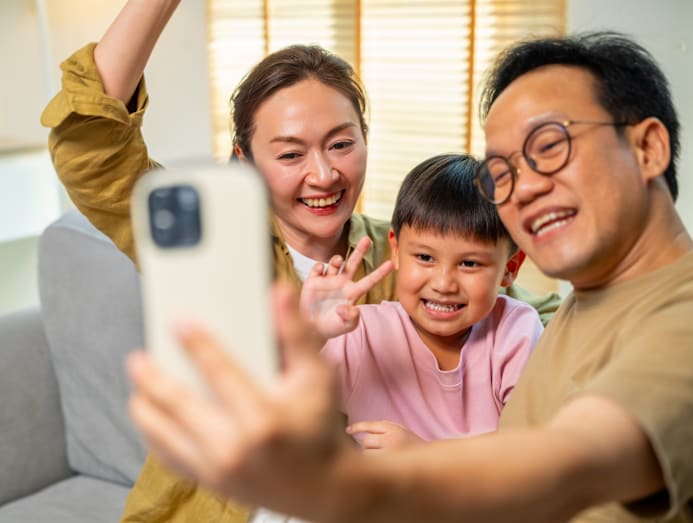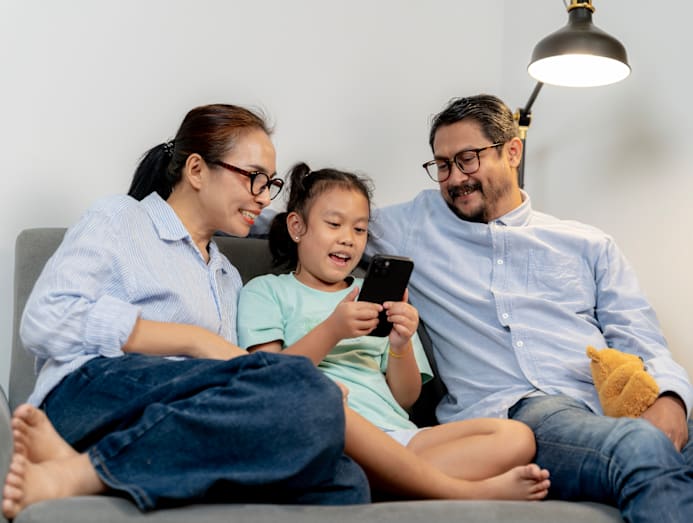In the age of AI, I still share my kids' photos online – but here's where I draw the line on what to post
Posting about her kids brings joy and connection, but with growing online risks, this mum-of-two has learnt that some moments are best kept just for family.

The dangers of the internet have led Ms Nabilah Awang to take precautions to protect her children's digital footprint. (Illustration: CNA/Samuel Woo, iStock)

This audio is generated by an AI tool.
The first time I shared a photo of my firstborn son online, he was just 30 days old.
I was still adjusting to motherhood, revelling in the fact that I now had a baby boy.
Sure, I could have shouted it from the rooftops, but posting it on social media felt like the easiest way to tell the world.
Now that he's four years old, I still find myself scrolling back to that photo, trying to remember how tiny those hands were.
Or when conversations about the newborn stage come up, I go straight to that picture and say: "This was how small he was!"
On my account page, I know exactly where to find it among my dozens of posts – unlike scrolling endlessly through the thousands of items in my phone gallery, which would take ages.
I've always found it heartwarming to capture and share memories of my children online. But now, I often find myself wondering how much of our children's lives we should share online, especially in an age of artificial intelligence (AI) where every photo can be re-edited in seconds.
HOW SOCIAL MEDIA HAS TRANSFORMED PARENTING
Social media has transformed modern parenting into a highly visible and heavily scrutinised experience. On one hand, it offers parents access to a wealth of information, support groups and expert advice.
It has also helped normalise honest conversations about the challenges of parenthood, such as burnout, postpartum depression and mental health.

But there's another side. Social media has fostered a culture of comparison, where curated highlight reels can often leave parents feeling inadequate or judged.
Influencer parenting is also rampant – people capitalising on their parenting experience by promoting trends and products, adding pressure or setting unrealistic expectations for the rest of us.
At the same time, I also follow parents who choose not to post their children online at all, or who blur their faces, especially on public accounts. For them, it’s about protecting their children from online harm, negative commentary, or simply thinking that posting pictures of their children online is performative.
I respect that deeply – what should always come first is the child’s wellbeing.
SHARING, BUT WITH INTENTION
The way I see it, posting updates isn’t about showing off – it's about connection.
Family and friends living in other parts of the world can feel a sense of involvement in our lives, celebrating milestones and the little joys that make up our days.
This is especially true for a dear friend who had relocated to the Netherlands. We would find ourselves laughing at a funny photo I shared of my two sons or marvelling at how tall her daughter has grown. It's our way of remaining part of each other’s daily lives, even from afar.
It also creates moments of joy in an otherwise hectic routine and allows us to reflect on the small wins that parenthood often obscures.
Despite this, I’m aware that the internet is not a safe place, and you never really know who’s lurking in your followers list.
So I don't post indiscriminately.
My Instagram account is fully private. I cleaned up my friends and followers list before my kids were born because I knew I wanted to share our daily lives with friends and family, and only fully clothed images and carefully chosen snapshots make it online.
I also never post anything that could embarrass them – tantrums, toilet training mishaps, or moments that should remain private.
No full names, no addresses, and no geotags that reveal our routines or locations.
And yes, that includes moments like when my son ran around the house in nothing other than a Spider-Man mask during a toilet training session and screaming, "Muuuuuum, look at my poop!"
They are hilarious, but images and recordings of such moments are there for our private collection of memories, not for the internet to immortalise.
GROWING UP WITH A DIGITAL TRAIL
Even with strict boundaries, I am conscious that my kids already have a digital footprint at a young age.
I know that every photo, caption or tag contributes to a record they did not consent to.
And yes, it's a little unnerving, especially when I think about how there’s a chance – however slim that may be – that a prospective employer might have access to this footprint, even if my account is fully private.
But all these concerns – comparison, judgment, and privacy – feel minute compared to my gravest fear: how easily children’s photos can be manipulated by AI.
An article by Monash University titled "Digital child abuse: Deepfakes and the rising danger of AI-generated exploitation" highlighted the alarming rise of AI-generated exploitation, where even innocent images can be altered to create synthetic child sexual abuse material without direct victim involvement.

This evolving threat turns what seems like harmless sharing into a serious risk with potentially devastating consequences.
For me, this risk alone justifies the decision to limit or avoid posting my children’s images online because ultimately I want them to have control over what their digital footprint looks like.
As they grow – they’re now aged three and four – I involve them in decisions. If they don't like a photo, it doesn't get posted.
Their photos also don't go on any public platforms, which will expose them to comments, be they positive or negative. Everything is strictly private.
I continue to review my followers vigilantly, and these days most pictures are shared only with a list of close friends – people I trust and who are truly part of our lives.
I still choose to post updates about my kids because it has helped us get closer to loved ones who don't live in the country and get to see them only once in a blue moon.
But every photo and moment shared is chosen carefully, with their privacy and dignity in mind.
And yes, some of the funniest, messiest moments are reserved for our own laughs – which, honestly, makes them even better.
Nabilah Awang is an editor specialising in commodity insights. She is a mother of two.













